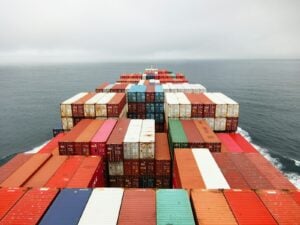In international trade, transactions involving maritime transport are often based on standardised contractual formulas. Among these, FAS (Free Alongside Ship) and FOB (Free On Board) sales are among the most widely used. These two types of contract, classified as outbound sales, have specific characteristics which determine the rights and obligations of the parties. Mastering their mechanisms is essential for any operator in maritime trade.
Key features of FAS and FOB sales
FAS and FOB sales fall into the category of sea outward sales, which means that delivery takes place at the port of shipment and that the goods then travel at the buyer's risk.
The concept of a sale at the outset
A sale by sea is considered to be a sale on departure when the transfer of risks takes place at the point of departure, i.e. before the goods embark on their sea voyage. Article L. 5424-2 of the French Transport Code states that "sale on departure places the goods sold at the risk and expense of the buyer, from the day they are delivered under the terms of the contract".
These sales are particularly well-suited to situations where the buyer wishes to control maritime transport, either because it has negotiated rates with carriers, or because it is integrating these goods into a wider logistics package that it controls.
Transfer of risk
The precise moment of transfer of risk is the fundamental difference between FAS and FOB sales:
- In an FAS (Free Alongside Ship) sale, the risks are transferred to the buyer when the goods are placed alongside the ship at the port of shipment. According to Article L. 5424-4 of the French Transport Code, "the seller delivers the goods sold alongside the designated ship".
- In an FOB (Free On Board) sale, the risks pass to the buyer once the goods have been loaded on board the ship. Article L. 5424-5 of the French Transport Code confirms that delivery takes place "when the thing sold is placed on board the ship".
This distinction is decisive in the event of damage to or loss of goods: if the incident occurs during loading, the seller bears the consequences in an FAS sale, whereas the buyer bears them in an FOB sale.
Distinction from ordinary sales
Unlike ordinary sales, where the seller generally delivers the goods to his premises (ex works or EXW sales), FAS and FOB sales involve an additional effort on the part of the seller. He must transport the goods to the port of shipment and, in the case of an FOB sale, ensure that they are loaded onto the ship.
These sea sales are also distinct from inbound sales, as explained in our detailed article on this subjectThe goods travel at the seller's risk to the port of destination.
The seller's obligations in FAS and FOB sales
The seller's obligations vary depending on whether the sale is FAS or FOB, although certain responsibilities are common to both.
Material obligations
In an FAS sale, the seller must:
- Getting the goods to the port of shipment
- Deliver the goods alongside the ship designated by the buyer
- Notify buyer of delivery within 24 hours
In an FOB sale, the seller assumes the same obligations, but must do more:
- Loading goods on board the ship
- Bear the costs and risks associated with this loading operation
Documentary obligations are also important: the seller must provide the buyer with all the usual documents, in particular the commercial invoice and, in some cases, a certificate attesting to the conformity of the goods.
Financial obligations
The seller bears all costs associated with the transport and storage of the goods up to the time of delivery. In the case of an FOB sale, this includes the cost of putting the goods on board, and even demurrage (compensation due if the loading time is exceeded) if this is the result of a delay attributable to the seller.
The seller must also complete customs formalities on export and bear the cost thereof. This obligation is explicitly provided for in the FAS and FOB Incoterms (rule A7).
Consequences of non-performance
If the seller fails to meet its obligations, the buyer has a number of remedies. They can:
- Invoking the defence of non-performance to suspend payment of the price
- Applying for enforcement
- Obtain rescission of the contract if the breach is sufficiently serious
- Claim damages for loss suffered
Case law generally considers that failure to deliver within the agreed deadline constitutes a breach justifying termination of the contract at the seller's expense, except in cases of force majeure.
The buyer's obligations in FAS and FOB sales
The buyer's obligations in FAS and FOB sales are particularly important, as he assumes a significant share of the logistical responsibility for the operation.
Freight supply
The buyer's main and characteristic obligation in FAS and FOB sales is to provide the freight, i.e. to conclude the charter or sea carriage contract. Specifically, he must:
- Choosing the vessel to transport the goods
- Negotiating the conditions of carriage with the shipowner
- Inform the seller of the name of the vessel and the planned loading date
This obligation fundamentally distinguishes him from the buyer in a CIF sale, where the seller supplies the freightThe risks are also transferred on departure.
In practice, the buyer may authorise the seller to conclude the contract of carriage on his behalf, which may be more practical if the seller is located close to the port of shipment. However, this delegation does not change the nature of the sale: legally, it is still the buyer who assumes responsibility for the freight.
The provision of insurance
The buyer is also responsible for insuring the goods, since he bears the risks of maritime transport. Although optional, taking out an insurance policy is highly recommended to protect against the many hazards of maritime transport: storms, general damage, theft, etc.
As with freight, the buyer may instruct the seller to take out insurance on his behalf. The choice of insurance cover must be adapted to the nature of the goods and the specific risks of the planned sea journey.
Financial and other obligations
The buyer must, of course, pay the agreed price for the goods. They must also pay various costs:
- The price of sea freight
- The insurance premium
- The cost of unloading at the port of destination
- Stevedoring costs in an FOB sale (unless otherwise agreed)
- Demurrage, if any, for which it is liable
It must also complete customs formalities on import and take delivery of the goods when the ship arrives at the port of destination.
Points of attention and legal risks
There are a number of aspects to which particular attention should be paid when concluding and executing an FAS or FOB sale.
Ship designation and timing
The precise designation of the vessel and the indication of loading dates are crucial elements. A delay in providing this information by the buyer may result in additional costs for the seller (storage costs, additional handling).
Conversely, if the seller is unable to deliver the goods on the agreed date, he may be held liable for demurrage due to the shipowner and for any commercial losses suffered by the buyer.
Customs formalities
Particular attention must be paid to customs formalities. In FAS and FOB sales, the seller is responsible for export formalities, while the buyer handles import formalities. An error or delay in these formalities can block the entire operation and generate considerable costs.
In the case of goods subject to restrictions or specific authorisations (strategic products, dual-use goods, etc.), it is advisable to check beforehand that the operation complies with the applicable regulations.
Frequent disputes and how to resolve them
The most frequent disputes in FAS and FOB sales concern..:
- Conformity of the goods with the contractual specifications
- Meeting delivery deadlines
- Allocation of unforeseen costs (demurrage, parking charges, etc.)
- Damage occurring during loading (particularly in FAS sales)
To prevent such disputes, it is advisable to draw up detailed contracts, setting out in particular the precise arrangements for checking the conformity of the goods and the procedures to be followed in the event of delays.
In the event of a dispute, an amicable settlement is generally preferable, given the costs and time involved in international legal proceedings. Failing that, maritime arbitration, which is faster and more specialised, is an interesting alternative to traditional legal proceedings.
To secure payment for these transactions, the use of the documentary credit offers guarantees to both seller and buyer.
Despite being standardised by Incoterms, FAS and FOB sales contracts require careful drafting to take account of the specific features of each commercial transaction. The right legal support can help to secure these transactions and avoid the most common pitfalls.
If you are considering a commercial transaction involving an FAS or FOB sale, or if you encounter difficulties in the performance of such a contract, our firm specialises in commercial maritime law can support you at every stage of your project.
Sources
- Transport Code, articles L. 5424-1 to L. 5424-6
- International Chamber of Commerce, Incoterms 2020
- United Nations Convention on Contracts for the International Sale of Goods (CISG)




